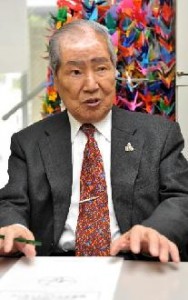Nuclear Weapons Can Be Eliminated: Chapter 9, Part 6
Apr. 22, 2010
Chapter 9: Messengers from Hiroshima
Part 6: Sunao Tsuboi
by Junichiro Hayashi, Staff Writer
About 2,000 people from Japan, including roughly 100 from Hiroshima, among them A-bomb survivors (hibakusha), will head to the United States in time for the Nuclear Non-proliferation Treaty (NPT) Review Conference to be held at U.N. headquarters in New York from May 3-28. They will visit the United States to appeal for the necessity of eliminating nuclear weapons. The Chugoku Shimbun will track their hopes and resolve with regard to the NPT Review Conference as well as the feelings of those who cannot visit the United States due to advanced age or poor health.
Sunao Tsuboi, 84, co-chairperson of the Japan Confederation of A- and H-bomb Sufferers Organizations, and a Hiroshima resident, expresses his feeling of conveying Hiroshima's message to the world as "adding a drop of water to the ocean."
Mr. Tsuboi will serve as the leader of a delegation of 54 people that the confederation will dispatch to the Nuclear Non-proliferation Treaty (NPT) Review Conference, an event held once every five years. It will be his fourth consecutive appearance at the NPT Review Conference since 1995.
He has seen a number of twists and turns with regard to the NPT. At the conference held in 2000, the member states, including the nuclear weapon states, agreed unanimously on "an unequivocal undertaking toward the elimination of nuclear weapons." However, in 2005, the conference fragmented without even adopting a final document.
In the run-up to this year's conference, U.S. President Barack Obama has spoken repeatedly about pursuing "a world without nuclear weapons." Mr. Tsuboi said, "I've been very inspired by Mr. Obama's words. I don't believe nuclear weapons can be eradicated in an instant, but I now want to see the creation of a firm road map toward their elimination. I'm determined to do everything I can to appeal for such a road map."
On August 6, 1945, Mr. Tsuboi was exposed to the atomic bombing in Fujimi-cho (now Naka Ward, Hiroshima), located 1.2 kilometers from the hypocenter. He suffered severe burns all over his body. "The people around me all suffered fatal injuries," he recalled. "They should have had their whole lives ahead of them. It made me wonder about life itself." On the way to a relative's house in the city, Mr. Tsuboi sat down on a bridge and scratched into the pavement with a stone: "Tsuboi died here."
But after a year of medical care, he completed his university studies. At 23, Mr. Tsuboi became a junior high school math teacher. Each year, as August 6 approached, he shared his experience of the atomic bombing with his students. Meanwhile, he was hospitalized repeatedly, taking a leave of absence on three occasions due to illness.
Since retiring, he has traveled to more than ten countries to attend A-bomb exhibitions held overseas, demonstrate against nuclear tests, and take part in other events. "Nuclear weapons can never protect human beings," he has stated in the places of his travels. His conviction that "A-bomb survivors (hibakusha) must stand at the forefront of this cause" spurs Mr. Tsuboi to act.
In conjunction with the NPT Review Conference, the confederation will hold an A-bomb exhibition at United Nations Headquarters in New York, which is the venue for the conference. A number of local schools and other entities have requested that the confederation provide opportunities to hear A-bomb accounts from survivors. "It's not enough, though, for hibakusha to simply speak about our experiences and for others to simply listen," Mr. Tsuboi said. "Unless we reach a shared understanding that nuclear weapons must never be justified, on human grounds, there will be no path toward the elimination of these weapons."
He feels a fresh and growing momentum internationally, which may be the impetus for advancing the cause of nuclear abolition. At the same time, he is very aware of the need to join forces with the citizens of the world to broaden the definition of peace and recognize that the disparity dividing the haves and have-nots, as well as issues of food and ethnic conflict, are at the heart of peace, too.
"In terms of our health, the hibakusha who will travel to the United States are in a precarious position. This might be our last opportunity. So we're committed to moving the hearts of as many people as we can. That is our mission," Mr. Tsuboi said.
(Originally published on April 19, 2010)
To comment on this article, please click the link below. Comments will be moderated and posted in a timely fashion. Comments may also appear in the Chugoku Shimbun newspaper.








